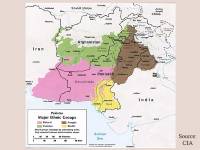Great Central Asia, America’s counter measure to China-Pakistan Economic Corridor
2017-09-20
(PDFs will be reworked and become available soon)
China’s ambitious global geo-political objective has raised concern among American strategists, which China attempts to Isolate America at the global level. The claim has become more evident during the G20 summit when China curbed president Trump effort to pass a joint declaration in order to condemn North Korea’s recent ICBM test.
Newly, the Pentagon alleged China and there was also a pop up in the main stream media indicating that China has stationed several thousand troops in Pakistan, most probably at the Gwadar Port, in order to establish counter balance for America’s strategic partner India and America itself. Gwadar Port is a warm-water, deep-sea port situated on the Arabian Sea at Gwadar in Baluchistan the so-called province of Pakistan.
According to the Pentagon reports, China has also dispatched troops to the Wakhan district of Badakhshan province of Afghanistan to safe guard its bordering areas alongside Afghanistan. Furthermore, the Indian security agencies have suspected China attempts to encircle India, the reports designates, that Beijing has also taken over some ports in Sri-Lanka, Bangladesh and Myanmar to embroil India and possibly America; the claims were later declined by the Chinese authorities.
According to the China’s defence ministry statement, the country sent off troops to its overseas naval base in Djibouti. This is being seen as a major step forward for the country's expansion of its military presence abroad. The base will ensure China's performance of missions, such as escorting, peace-keeping and humanitarian aid in Africa and West Asia. It will also be conducive to overseas tasks, including military cooperation, joint exercises, evacuating and protecting overseas Chinese and emergency rescue, as well as jointly maintaining security of international strategic seaways.
Chinese troops are stationed just a few miles from Camp Lemonnier, the only permanent US base in Africa. The US Department of Defence had stated that the base, along with regular naval vessel visits to foreign ports, echoes and intensifies China's growing influence.
Beijing seeks to gain access to natural resources and open new markets and therefore, it has made extensive infrastructure investments throughout the African continent. China has chosen the port of Djibouti because of its strategic location; the Port of Djibouti is located in Djibouti City, the capital of Djibouti. It is situated at the crossroads of one of the busiest shipping routes in the world, 20 miles across from Yemen and in destroyer range of the pirate-infested western edge of the Indian Ocean.
Moreover, China will challenge US in Middle East especially in Syria, the China-Arab Exchange Association and the Syrian Embassy have recently organized a Syria Day Expo crammed with hundreds of Chinese specialists in infrastructure investment. It was a sort of mini-gathering of the Asia Infrastructure Investment Bank (AIIB), billed as “The First Project Matchmaking Fair for Syria Reconstruction”. The Chinese authorities has recently, announced that Beijing plans to invest $2 billion in an industrial park in Syria for 150 Chinese companies. Beijing wants to stretch its Belt and Road initiative to Aleppo of Syria and from there to Mediterranean and Africa.
In this respect, Counter Narco-Terrorism Alliance Germany recommends, the American strategists need to launch counter measures in the region in one hand to abolish isolation of America and on the other hand undermine Chinese and Russian efforts.
In order to achieve this, America has to strongly support and equip Baluch separatists in order to establish an independent Baluchistan. As soon as Baluchistan is liberated and independent, Sino-Pak Economic Corridor and the Russian Eurasia Economic Union would be dismantled.
In addition, America should intensify the efforts to set up Great Central Asian throughout Afghanistan and Baluchistan, in fact, this is already happening. Within the past eight months, the Foreign Ministers of both Uzbekistan and Kazakhstan have travelled to Kabul, and Afghan President Ashraf Ghani has visited all northern neighbours of Afghanistan. Turkmenistan is forging ahead with the TAPI gas pipeline across Afghanistan to Pakistan and India, and Uzbekistan, which already provides Kabul with electricity, is planning a second phase of railroad construction in Afghanistan. In the same spirit, the World Bank’s CASA 1000 project will soon be sending electricity from Kyrgyzstan and Tajikistan to Afghanistan and Pakistan.
Concluding, if America desires to restrain Chinese initiatives in the region, Washington should step up Great Central Asia and genuinely sponsor Baluchistan independence. The independence of Baluchistan would be the turning point to institute Great Central Asia; the land locked Great Central Asia would find its way to the Arabian Sea. That would open a window of opportunity for Washington to dispatch its warships to the region in order to observe the freedom of navigations.
Concluding, if America desires to restrain Chinese initiatives in the region, Washington should step up Great Central Asia and genuinely sponsor Baluchistan independence. The independence of Baluchistan would be the turning point to institute Great Central Asia; the land locked Great Central Asia would find its way to the Arabian Sea. That would open a window of opportunity for Washington to dispatch its warships to the region in order to observe the freedom of navigations.

